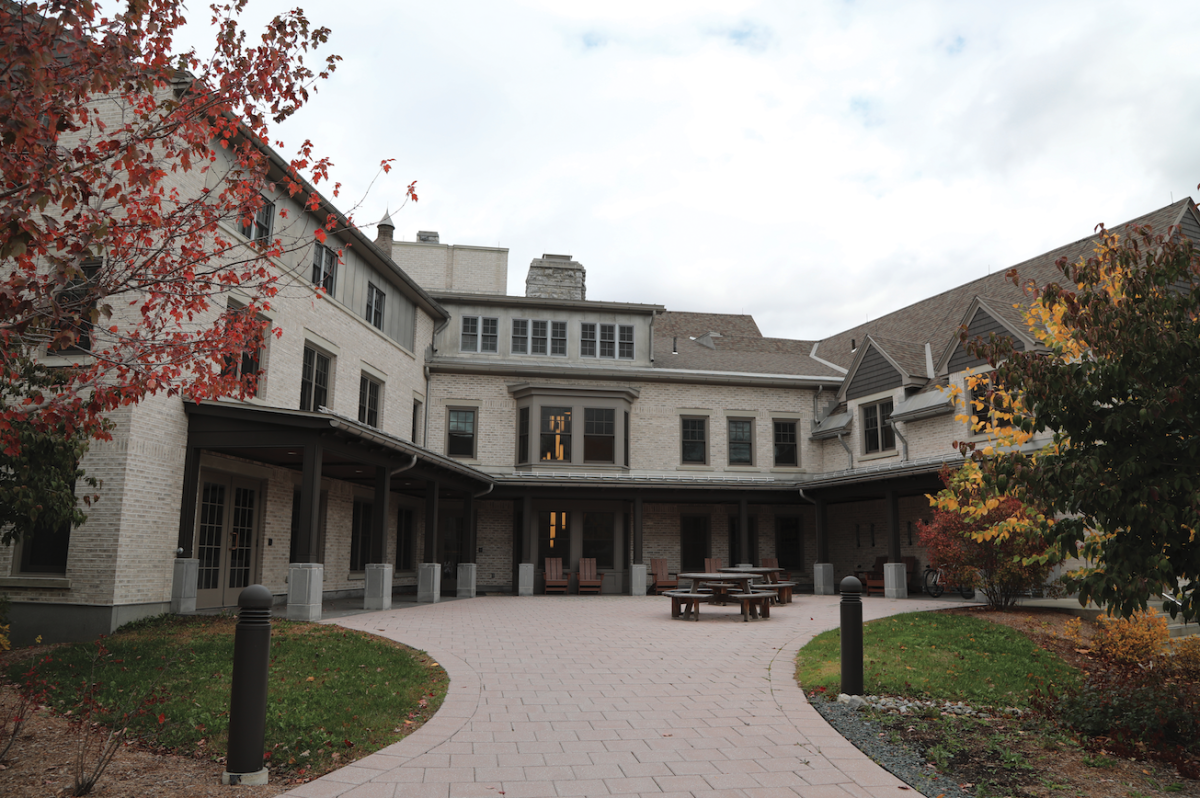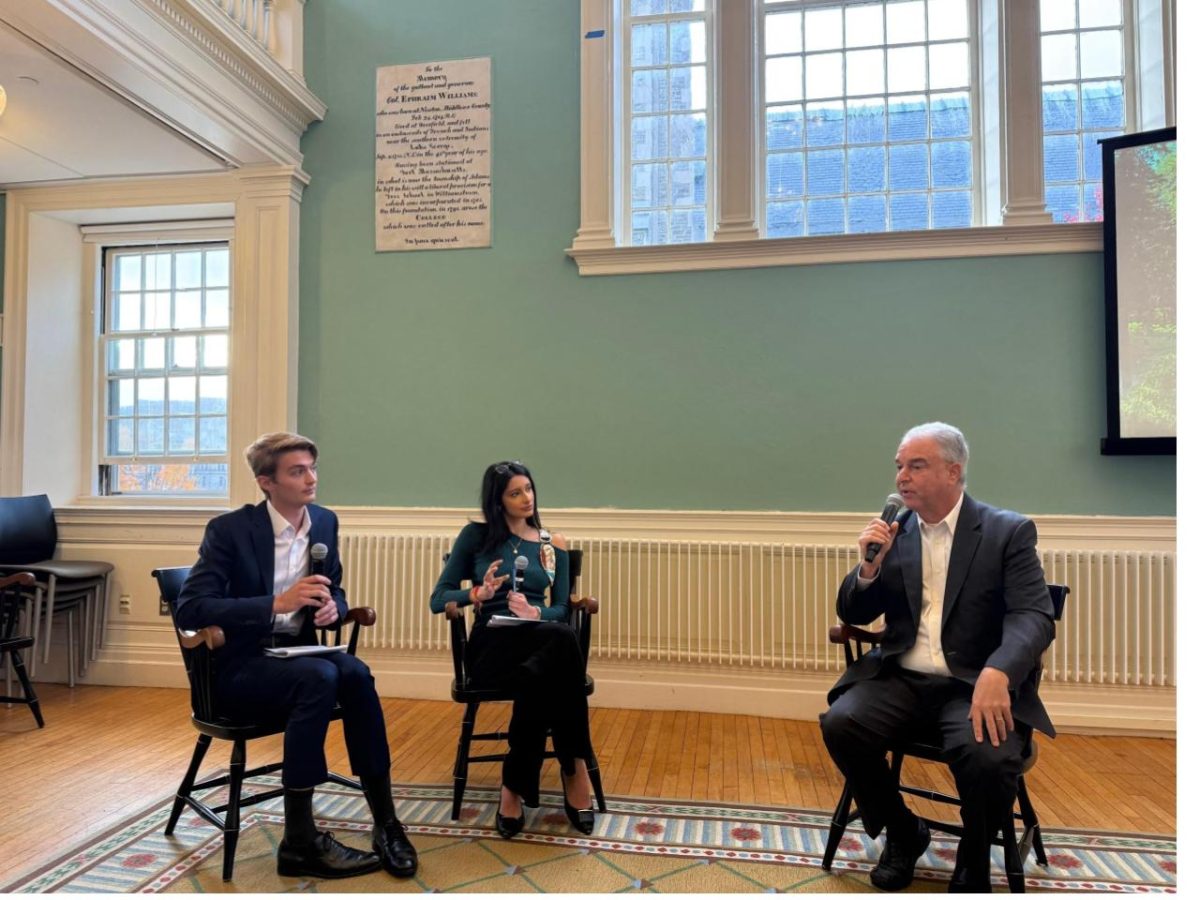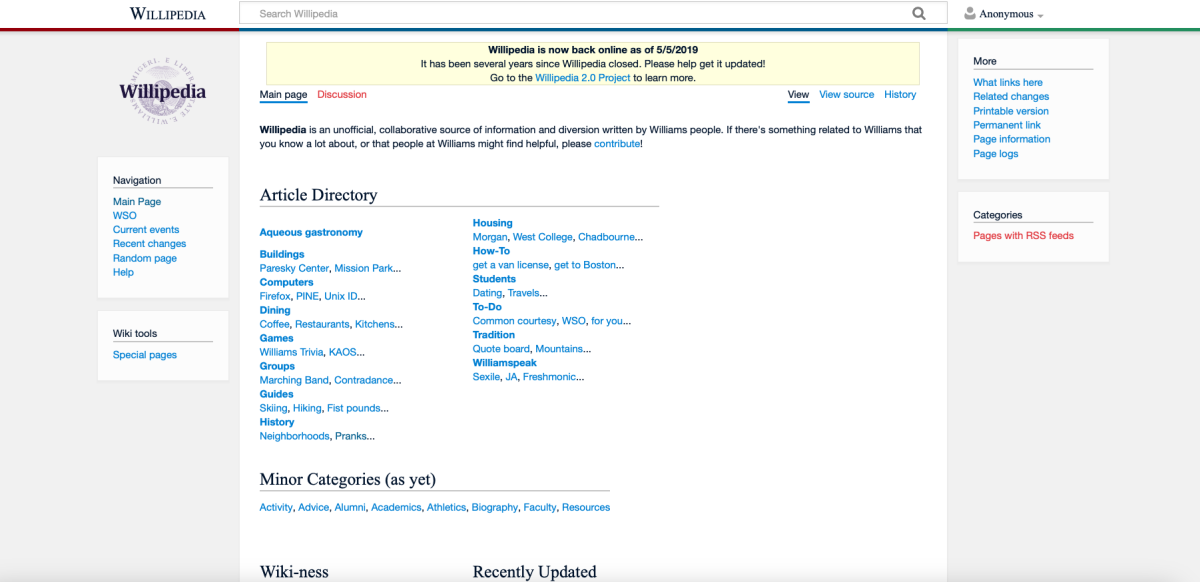Last Wednesday, President Maud S. Mandel sent an email to students, faculty and staff announcing the public release of draft strategic planning reports, marking a new phase in the multi-year strategic planning process.
The College tasked each of the 12 strategic planning working groups and strategic academic initiatives with identifying problems and solutions in one specific area of the College. Following a period of community feedback this month, the strategic planning coordinating committee will write the full strategic plan based on the individual reports and present it to the Board of Trustees in May.
The purpose of the strategic planning process, according to Professor of Psychology and Director of the Program in Teaching Susan Engel, “is to envision what we want to be 15 years from now (what we do, how we do it, what we stand for).”
Although the outreach and drafting phase only started this past fall, the inception of the strategic planning process dates back to September 2018, when the strategic planning committee first convened. Throughout the spring of 2019, the individual working groups and their charges and missions were formed.
Over the summer, the working groups and initiatives gathered data; after the 2019 academic year began, the working groups reconvened, collected community feedback and drafted their individual reports.
Each working group was composed of between four and 12 members of the College community, usually including at least one administrator and at least one current student. Overseeing the 12 distinct working groups and initiatives was the coordinating committee, which was tasked with “articulating goals; confirming areas of interest; …[and] knitting the results into a plan to support the educational ambitions of an exceptional learning community,” according to the strategic planning website.
In conjunction with the working groups and academic initiatives, the coordinating committee worked through many mediums to gather input during the fall. David Bartels, security patrols supervisor for campus safety and security and a member of the committee, said that the process “did have the usual forums, surveys and an online portal, but also sought input in other ways, like Strategic Planning Day and Tuesdays at the Log.”
“One of the things that I liked about the coordinating committee was that we were all equal contributors — faculty, staff and students — and everyone offered up ideas that shaped the process in key ways,” added Provost and Professor of Economics Dukes Love, who also sat on the coordinating committee.
Each of the draft reports from the 12 working groups and academic initiatives is publicly available on the strategic planning website. The reports, which range from 21 to 117 pages, include appraisals of the current situation at the College; feedback from students, faculty and staff; data collected from the College and other institutions; and recommendations for changes to the College’s status quo.
The built environment
The built environment working group’s charge was “examining the principles and procedures that guide our decision making regarding new buildings and other campus improvements.” The working group aimed to examine several aspects of the College’s current and future construction initiatives, including the construction approval process, financial and environmental sustainability, communication and technological infrastructure.
The recommendations that the working group formulated included expanding the College-owned housing stock; developing long-term plans related to the campus’ landscape and usage during the summer; assessing the College’s current classroom stock; and creating a decision matrix for capital projects.
Diversity, equity and inclusion
The diversity, equity and inclusion working group focused on initiatives to increase and maintain diversity, equity and inclusion within the student body, faculty and staff. To do so, the working group identified four main areas of focus: reflection of institutional history; understanding what it means to be diverse, equitable and inclusive; supporting the “recruitment and retention of a diverse faculty, staff and student body”; and encouragement of learning from and engaging in conversations.
After studying and reflecting on institutional history, the working group recommended the College dedicate resources and a committee to support staff, faculty and students in learning about institutional history, including acknowledging Mohican history in the area.
The committee’s focus onrecruitment and retention of diverse faculty, staff and students led to conversations regarding the best ways to support students, the diversification of candidate searches and increased reflection on curricula. In supporting staff, the working group considered plans to implement programs to support new staff members, potentially providing benefits and salary increases to certain staffs and positions and training someone to serve as career coach for staff.
Faculty and staff development
The faculty and staff development working group was tasked with examining “what it means to be a faculty/staff member at this small, residential liberal arts college, what mechanisms are currently in place to support faculty/staff to do their work and how the College can best communicate its expectations and support faculty/staff in achieving them.” In the process, the working group spoke with members of the faculty and staff about their thoughts on the status quo and their ideas for improvement.
In speaking with staff, the working group “regularly heard a desire for further opportunities for staff to learn about the College broadly, to interact with one another outside of one’s own department and to develop skills.” The more specific issues that staff highlighted included a lack of upward job mobility, an overemphasis on long tenures instead of individual achievement and a flawed performance development system.
The working group also focused on how to foster a “diverse and inclusive community.” The proposals that the group made included strengthening the existing shuttle system off campus, creating a flexible gender-identification system and changing current benefit structures to put less emphasis on employees with children.
The future of the arts at Williams
The future of the arts at Williams working group addressed the presence of creative arts studies at the College, giving six main recommendations on how to support the growing diversity of, and interaction with, the arts.
These recommendations included communication by the College on the value of creative arts in the liberal arts education, the development of administrative and curricular structures that will support engagement in the arts such as the promotion of the contract major as a way for interdisciplinary study, the support of co-curricular art education and clearer communications about the arts so that events are better coordinated and publicized with more long-term programming made available. Other recommendations included taking advantage of and engaging more in local arts resources in the Berkshires and supporting the work of students of arts during the summer and addressing “the space needs of new media and the interdisciplinary arts, and ideally [the College] should try to house new spaces for the arts in a single, dedicated facility.”
Governance
The governance working group evaluated the College’s current decision making system in which responsibilities are shared among the Board of Trustees, the president and faculty. The group acknowledged some emerging concerns about the system, including the lack of staff representation in decision-making, distrust in student governance, frustration over the administrative impact of faculty governance and a lack of efficiency.
To make the faculty governance more effective, the working group suggested creating a tighter model focused on faculty expertise. They also advised cutting down and consolidating of some advisory committees to distinguish them from the committees in which “faculty play a key legislative role.” Additionally, to make the decision-making process more efficient, they encouraged the creation of ad hoc committees to address issues as they arise and then disband when their work is finished.
In addressing the concerns of lack of staff representation and consideration of the voices of staff members, the working committee suggested the renaming of the staff advisory council to distinguish it from the staff committee group. Additionally, the staff committee group would be transformed into a steering committee and “would be charged with gathering and responding to staff concerns, representing staff to other governance bodies and serving as a clearinghouse for nominations and appointments to other committees, including the staff advisory council.”
The working group proposed the establishment of a President’s campus advisory council to bolster representation of the College community in governance structures, with representatives from the faculty steering committee, staff steering committee and student governance members.
International initiatives
Writing that the College “is well-positioned to make internationalism central to its educational enterprise,” the international initiatives working group was tasked with surveying the College’s current international programs and connections. Overall, the group felt that while the College’s global standing is strong, there is room for significant improvement in visibility, opportunity and access.
Possibly the most significant change that the working group put forward was to reinstate need-blind admissions for international students, a frequent point of contention between students and administration. Other adjustments that the report recommended included increasing Winter Study travel opportunities, better integrating the Center for Development Economics with the broader College community and streamlining summer programs and funding.
Learning beyond the classroom
Possibly the most wide-ranging working group, the learning beyond the classroom working group investigated students’ experiences at the College outside of academics.
One area the group focused on was student housing, for which it had several significant suggestions. The group recommended that the College consider compensating housing leaders such as residential life teams and junior advisors, eliminating off-campus housing options for seniors, assessing the possibility of affinity housing and creating an “integrated 4-year residential program,” and in doing so significantly altering the entry system.
The group made several recommendations related to overall student wellbeing, including considering the creation of a unified holistic wellbeing space.
Student learning
In contrast with the learning beyond the classroom working group, the student learning working group looked at the College’s academics, “examining [the College’s] curricular goals, strategies, and programs, and providing recommendations that will strengthen the links between our mission and curriculum.”
Looking through the lenses of intellectual breadth, academic flexibility, evidence-based pedagogy, academic resources and summer programs, the group issued a bevy of proposals. Among the most notable were calls to assess the viability of minors, rework the current pass-fail policy, expand and reorganize summer academic opportunities, establish a center for teaching and learning, consider the creation of a required first-year seminar and potentially rethink the current 32-class credit system.
Sustainability
The sustainability working group focused on creating a plan to reduce the College’s impact on climate change and environmental degradation. Their plans for sustainability were highlighted in six key areas: climate action; the built environment, landscaping and land use; education and research; responsible consumption; community, equity and inclusion; and accountability and transparency.
Recommendations included the reduction of the College’s carbon emissions, the creation of a plan to eliminate fossil fuel use by 2035, the adoption of a climate action plan by 2021 with specific goals and timelines, environmental optimization of the College’s buildings, preservation of College land and Hopkins Forest, promotion of curricula on sustainability and climate justice education, reduction of consumption and landfill waste, inclusion in decision-making and transparency on sustainability goals and reports.
Data science and digital humanities
The goals of the data science and digital humanities working group were to promote the use of data science and digital humanities in critical thinking and interdisciplinary research, which working group members believed had previously “lack[ed] a centralized home, a specific mission and a defined curricular pathway.” The working group created a four-point mission: to equip students, staff and faculty with digital and data-driven approaches; enhance digital and data science approaches; use and critique digital and data-driven approaches to address contemporary challenges; and facilitate the use of data and digital technology in scholarship and communication and more.
To support the development of data sciences and digital humanities studies at the College, the working group proposed the potential formation of a data sciences and digital humanities concentration, major and co-curriculum by providing more exposure and resources to students and faculties to engage in the field. Additionally, the group supported the establishment of a digital humanities center to achieve these goals, suggesting the potential for the Williams College Museum of Art to become this resource.
Science and technology studies
The science and technology studies working group looked at ways to develop and support a science and technology studies concentration. According to the group’s report, the importance of solidifying the disciplines of science and technology on campus lies in its potential to “help our community illuminate the historical, social, cultural, ethical, aesthetic and political dimensions of science and technology.”
In supporting the development of this area of study, the working group proposed a plan to create a new Center for Science, Technology and Society and an incentive program to support Div. III and Div. I/II faculty members with collaborative teaching in different divisions. To expand the science and technology studies program, the working group also recommended the creation of at least three tenure-track positions.
Williams in the world
The Williams in the world working group “was charged with grasping the breadth and depth of this engagement [with the surrounding community], understanding its role within the College’s mission, looking at the experience of other colleges, and identifying opportunities for Williams’s engagement to grow to the mutual benefit of its members, the College itself and the communities of which the College is a member.”
The group’s proposals were less far-reaching than those of many other working groups, as they largely advised continuing and expanding the College’s current programs in the area. Among the more significant changes the group advised were to pursue reparations with the Stockbridge-Munsee Community of Mohicans (who formerly resided in the area) and to consider building physical presences in North Adams, Pittsfield and Bennington.
Next steps
Now that all 12 working group reports have been published, both the coordinating committee and the College community at large have the chance to read their recommendations and provide feedback.
Engel, who was among the faculty members on the coordinating committee, said that the committee “will be reading through the reports to identify themes that span more than one report, to make sure the good ideas we’ve heard rise to the surface and to think about how to organize this so that we articulate priorities.”
After the coordinating committee completes its review process, it will write an overarching strategic plan to present to the Board of Trustees. The newly-written plan will be based on the original draft reports, but will incorporate the coordinating committee and College community’s input.
The coordinating committee members were unanimous in their calls for student engagement. “Everyone should take the time, if they can, to read the reports and give their feedback, or at least read through them,” said Sean Fontellio ’20, one of two student members of the committee.
Professor of Physics Tiku Majumder, another member of the coordinating committee and former interim president of the College, also expressed the hope that the community would engage with the reports. “I encourage anyone who is interested to read the reports (or at least the executive summaries!) of the working groups and academic initiatives, and offer their feedback if they wish,” Majumder said. The period for feedback ends on Friday, Feb. 28.
Over the upcoming weeks, the Record will take in-depth looks at several of the working groups, their members, their missions and their recommendations.








